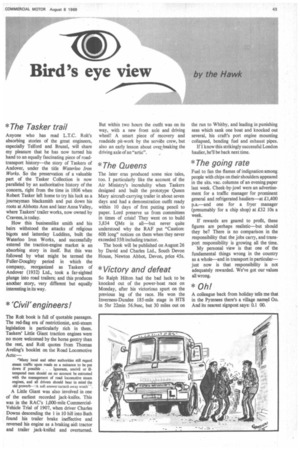Bird's eye view
Page 45

If you've noticed an error in this article please click here to report it so we can fix it.
*The Tasker trail
Anyone who has read L.T.C. Rolt's absorbing stories of the great engineers, especially Telford and Brunel, will share my pleasure that he has now turned his hand to an equally fascinating piece of roadtransport history—the story of Taskers of Andover, under the title Waterloo Iron Works. So the preservation of a valuable part of the Tasker Collection is now paralleled by an authoritative history of the concern, right from the time in 1806 when Robert Tasker left home to try his luck as a journeyman blacksmith and put down his roots at Abbotts Ann and later Anna Valley, where Taskers' trailer works, now owned by C ravens, is today.
How this businesslike smith and his heirs withstood the attacks of religious bigots and latterday Luddites, built the Waterloo Iron Works, and successfully entered the traction-engine market is an absorbing story in itself. But this was followed by what might be termed the Fuller-Doughty period in which the company, reorganized as Taskers of Andover (1932) Ltd., took a far-sighted plunge into road trailers; and this produces another story, very different but equally interesting in its way.
* 'Civil' engineers!
The Rolt book is full of quotable passages. The red-flag era of restrictionist, anti-steam legislation is particularly rich in them. Taskers' Little Giant traction engines were no more welcomed by the horse gentry than the rest, and Rolt quotes from Thomas Aveling's booklet on tile Road Locomotive Acts:—
"Many local and other authorities still regard steam traffic upon roads as a nuisance to be put
down if possible . . Ignorant, uncivil or illtempered men should on no account be entrusted with the management of road locomotive steam engines, and all drivers should bear in mind the old proverb— 'A soft answer rurneth away wrath'
A Little Giant was also involved in one of the earliest recorded jack-knifes. This was in the RAC's 1,000-mile CommercialVehicle Trial of 1907, when driver Charles Downs descending the 1 in 10 hill into Bath found his trailer brake ineffective and reversed his engine as a braking aid: tractor and trailer jack-knifed and overturned. But within two hours the outfit was on its way, with a new front axle and driving wheel! A smart piece of recovery and roadside pit-work by the service crew, but also an early lesson about over-braking the driving axle of an "artic".
*The Queens
The later eras produced some nice tales, too. I particularly like the account of the Air Ministry's incredulity when Taskers designed and built the prototype Queen Mary aircraft-carrying trailer in about seven days and had a demonstration outfit ready within 10 days of first putting pencil to paper. Lord preserve us from committees in times of crisis! They went on to build 3,834 QM s in all—but never quite understood why the RAF put "Caution: 60ft long" notices on them when they never exceeded 55ft including tractor.
The book will be published on August 26 by David and Charles Ltd., South Devon House, Newton Abbot, Devon, price 455.
*Victory and defeat
So Ralph Hilton had the bad luck to be knocked out of the power-boat race on Monday, after his victorious spurt on the previous leg of the race. He won the Inverness-Dundee 185-mile stage in HTS in 5hr 22min 56.9sec, but 30 miles out on the run to Whitby, and leading in punishing seas which sank one boat and knocked out several, his craft's port engine mounting collapsed, bending fuel and exhaust pipes.
If I know this strikingly successful London haulier, he'll be back next time.
*The going rate
Fuel to fan the flames of indignation among people with chips on their shoulders appeared in the sits. vac. columns of an evening paper last week. Cheek-by-jowl were an advertisement for a traffic manager for prominent general and refrigerated hauliers—at £1,400 p.a.—and one for a fryer manager (presumably for a chip shop) at £.32 lOs a week.
If rewards are geared to profit, these figures are perhaps realistic—but should they be? There is no comparison in the responsibility that the jobs carry, and transport responsibility is growing all the time.
My personal view is that one of the fundamental things wrong in the country as a whole—and in transport in particular— just now is that responsibility is not adequately rewarded. We've got our values all wrong.
*Oh!
A colleague back from holiday tells me that in the Pyrenees there's a village name,d 0o. And its nearest signpost says: 0.1 00.




































































































